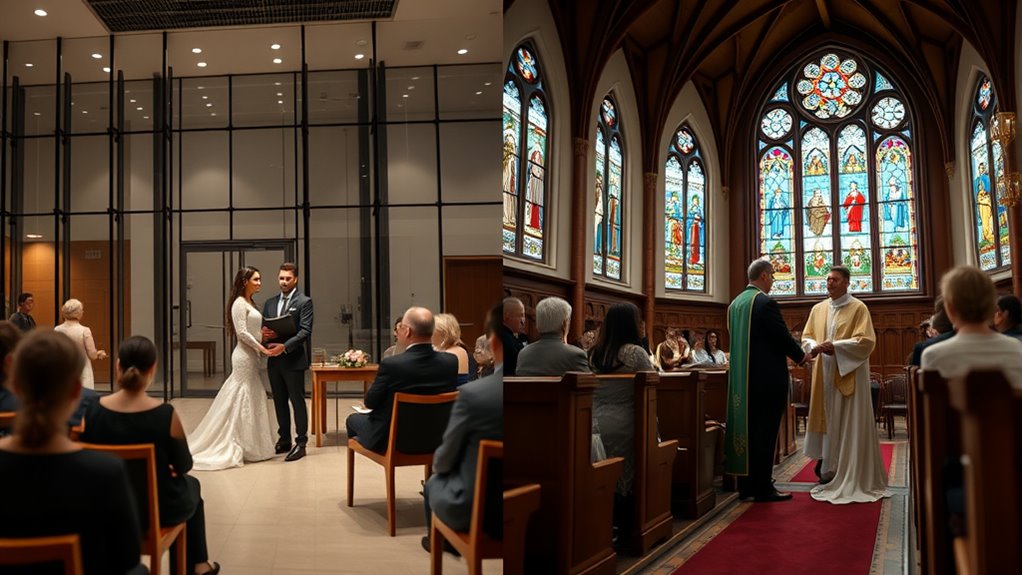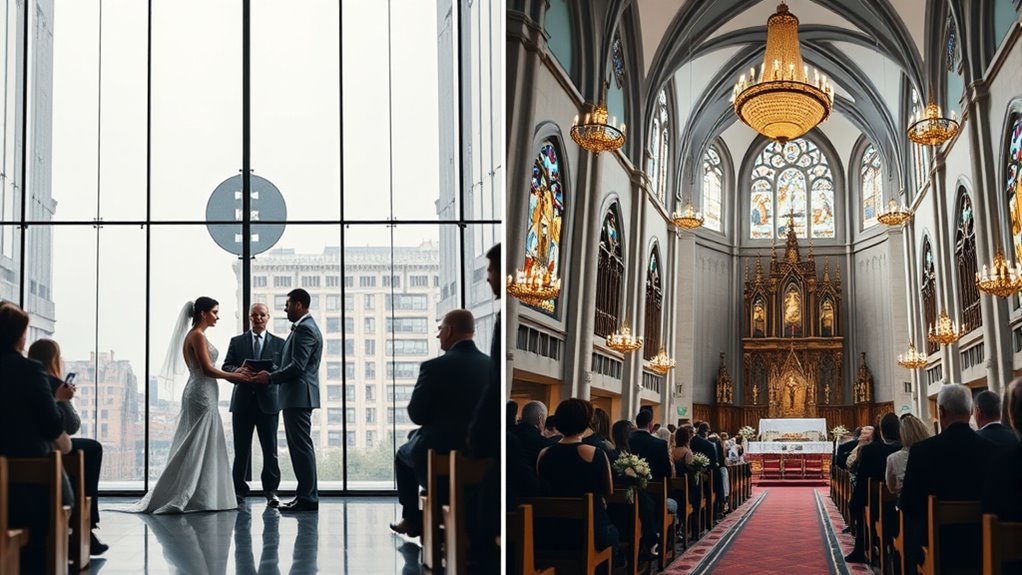In choosing between civil and church ceremonies in 2025, you’ll find that civil events offer flexibility, customization, and lower costs, making them ideal if you want a personalized, inclusive celebration. Church ceremonies emphasize tradition, community, and spiritual meaning, though they can be pricier and more rigid. Consider whether legal recognition or spiritual significance matters most for you. To explore which option fits your style and beliefs, keep exploring the differences and advantages further.
Key Takeaways
- Civil ceremonies offer customizable, inclusive services with straightforward legal recognition, often at lower costs.
- Church ceremonies emphasize tradition, community, and spiritual significance but may involve higher expenses and strict requirements.
- Civil options are ideal for interfaith couples seeking flexibility, while church weddings prioritize religious doctrines and customs.
- Legal validity is typically clearer with civil ceremonies; religious ceremonies may require additional legal steps.
- Cost differences reflect formality levels, with civil ceremonies generally being more budget-friendly than church services.

When it comes to tying the knot, couples often face the choice between civil and church ceremonies, each offering distinct experiences and significance. If you’re contemplating an interfaith relationship, this decision can become even more nuanced. Civil ceremonies tend to be more flexible when it comes to interfaith compatibility, allowing you to craft a personalized service that respects both backgrounds without being limited by religious doctrines. They also provide straightforward legal recognition, ensuring your marriage is officially recognized without needing religious approval. This is especially helpful if you want a ceremony that’s inclusive and adaptable to both partners’ beliefs or lack thereof.
Civil ceremonies offer flexible, personalized options with straightforward legal recognition, ideal for inclusive and interfaith marriages.
On the other hand, church ceremonies carry their own weight of tradition and spiritual significance. If your faith plays a central role in your life, a religious service can deepen your connection and reflect your shared beliefs. However, this route can be more complex when dealing with interfaith marriages, as some denominations may have strict requirements or reservations about marrying individuals of different faiths. It’s worth investigating whether your chosen church is open to interfaith unions and what steps you’ll need to take to meet their doctrinal standards. Keep in mind that a church wedding may not always provide the same level of legal recognition as a civil ceremony, depending on your location and the denomination’s policies. You might need to have a civil ceremony beforehand or afterward to ensure your marriage is legally valid.
Cost is another factor to consider. Civil ceremonies often cost less because they typically involve fewer formalities and no religious fees. Churches might charge for their services, require donations, or have additional expenses for clergy and facilities. But beyond costs, think about the experience you want. A civil ceremony might be simpler but highly customizable, perfect if you’re seeking a non-traditional or secular celebration. Conversely, a church service offers a sense of community and spiritual blessing that many couples find meaningful, even if it comes with more formalities and potentially higher costs.
Additionally, understanding interfaith compatibility can help you navigate potential challenges and ensure your ceremony aligns with both your beliefs and values. Ultimately, your choice depends on what matters most to you and your partner. Do you prioritize legal recognition and flexibility, especially in an interfaith context? Or does the spiritual significance and tradition of a church hold more importance? Whatever your decision, understanding the differences in how each ceremony handles interfaith compatibility and legal recognition will help you create a wedding that’s truly meaningful and legitimate.
Frequently Asked Questions
How Do I Choose Between a Civil and Church Wedding?
When choosing between a civil and church wedding, consider what feels most meaningful to you. Think about the cultural significance you want to honor and the ceremony atmosphere you desire—whether it’s a more formal church setting or a personalized civil event. You’ll want to reflect on your beliefs, traditions, and style, ensuring the ceremony aligns with your values and creates the special moment you envision for your big day.
Can I Have a Religious Ceremony at a Civil Venue?
Yes, you can have a religious ceremony at a civil venue, but you’ll need to verify venue restrictions first. Some venues may have policies about religious symbolism or certain rituals, so clarify what’s allowed. You can incorporate religious elements into your ceremony, but guarantee the venue permits it. Planning ahead ensures your ceremony reflects your faith while respecting the venue’s rules, creating a meaningful and smooth experience.
Are Marriage Licenses Different for Civil and Church Weddings?
Imagine holding two different keys: one opens a church, the other a government office. Marriage license requirements vary slightly for civil and church weddings, but both demand valid IDs and completed forms. Civil ceremonies often require officiants authorized by the state, while church weddings may involve clergy. While the licenses serve the same purpose—legally marrying you—the process and officiant types differ, making each ceremony unique in its legal steps.
What Legal Requirements Are Involved in Each Type of Ceremony?
For both civil and church ceremonies, you need to complete marriage registration and obtain legal documentation like a marriage license. Civil ceremonies usually require you to visit a government office, provide identification, and pay a fee. Church weddings often involve meeting with clergy, making sure your marriage meets religious requirements, and submitting legal documentation to register your marriage. In both cases, compliance ensures your marriage is legally recognized.
Can I Customize Vows in Civil and Church Ceremonies?
You can definitely customize vows in both civil and church ceremonies. Vow customization allows you to personalize your ceremony, making it more meaningful and unique to your relationship. Most officiants or clergy are open to ceremony personalization, so you can craft heartfelt promises that reflect your commitment. Just check with your officiant beforehand to guarantee your personalized vows fit within the ceremony’s guidelines and traditions.
Conclusion
Choosing between a civil and a church ceremony isn’t just about tradition or legality—it’s about your personal story. While a church wedding might offer spiritual meaning and community support, a civil ceremony provides flexibility and simplicity. Both come with costs and considerations; the key is aligning your choice with your values and vision. Whichever you pick, remember it’s your day, shaped by your beliefs and dreams—making the decision uniquely yours.









